24 july 2019
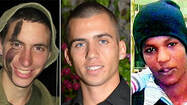
The statement comes just hours after Israel held a ceremony commemorating IDF troops fallen in the 2014 war, where Netanyahu vowed to bring back all those still held in Gaza; adds Israel is preparing for an ‘extensive’ military operation in enclave
The Hamas terror group on Tuesday said there’s a “real chance” to negotiate a return of Israeli MIAs and POWs but the window of opportunity “could soon be closed.” The statement comes just hours after a state ceremony was held in Jerusalem commemorating Israeli troops fallen in the 2014 Gaza war known as Operation Protective Edge.
The bodies of Hadar Goldin and Oron Shaul, who died alongside four other IDF soldiers during Protective Edge on July 20, 2014, are believed to be held by the terror group in the enclave to this day. Israel recently marked five years since the seven-week-long war broke out.
“Israeli government continues to lie about its MIAs," said a spokesman for Hamas' armed wing, Abu Obeida, "The enemy’s leadership avoids having to deal with the truth and it’s paying the price."
“There is a real chance to resolve the issue … if Israeli leadership is serious,” he said, adding that "this case may soon be closed, take the Ron Arad affair as a lesson to learn from."
Goldin and Shaul were traveling through the Shuja'iyya neighborhood in Gaza City in an armored personnel carrier that was hit by an anti-tank missile, killing the six soldiers in it. Hamas quickly declared it had seized Oron and Hadar, not mentioning if the soldiers are alive or dead. The IDF declared the two as deceased soldiers whose burial place is unknown shortly after the incident.
In addition, Hamas claims to have captured, Avera Mengistu and Hisham al-Sayed, two mentally ill Israelis who voluntarily crossed into Gaza several years ago.
Prime Minister Benjamin Netanyahu spoke at Tuesday’s memorial ceremony in Jerusalem vowing to bring back the bodies of the two soldiers as well as the two citizens held by the terror group.
“We are committed to bringing Oron Shaul and Hadar Goldin, as well as Avera Mengistu and Hisham al-Sayed, back home,” said Netanyahu. “I cannot go into detail here about everything that we are doing but we are doing very much.”
Netanyahu then went to warn the Palestinian factions in the Strip that despite the recent efforts to achieve a possible long-term ceasefire arrangement, the military continues to make plans for a military campaign in the enclave.
"We are working to achieve calm, but we are prepared to embark on a campaign, an extensive military operation to strike Hamas and Islamic Jihad,” he said. “I cannot go into details but those who are involved in these preparations, who are sitting here today, know very well that these are not mere words."
Al-Qassam: Real opportunity for prisoner swap exists
Spokesman for al-Qassam Brigades, the armed wing of the Islamic Resistance Movement, Hamas, Abu Obaida has accused the Israeli government of lying to the families of the Israelis held captive in the Gaza Strip.
This was voiced in a televised speech on Tuesday evening on the latest developments in the issue of the Israeli soldiers and persons who were captured by the Palestinian resistance during the 2014 military assault on the besieged territory.
Abu Obaida said that Israel seeks to justify its neglect of the detained soldiers by saying "they are corpses and remains." He added," If this hypothesis is correct, why have they not taken the initiative to achieve the dream of their families to bring back these corpses, knowing that the price they will have to pay for corpses is a modest one in comparison with living persons?"
"The greatest example of the procrastination and the lying of the Israeli government and military leadership is the issue of Mengistu, the Jew who is of Ethiopian origins. We affirm that Israel has not raised his issue with the mediators at all," said Abu Obaida.
"Israel did not attempt to ask about whether Mengistu is dead or alive," he said, adding that the Israeli government practices racial discrimination without any shame even against its own citizens.
Addressing the families of the captives, al-Qassam Brigades' spokesman warned them not to trust Prime Minister Benjamin Netanyahu nor the leaders who had served in the military during the 2014 assault on Gaza or believe their lies and misleading information.
"We affirm that there is a real opportunity to resolve the issue of the prisoners and missing persons if Israel is serious about opening this file and paying the price through the clear path that led to resolving similar issues in the past," Abu Obaida said.
He continued, "But we warn that this file could be subject to being forgotten or completely closed for reasons that Israel knows well."
Abu Obaida concluded his speech by hailing the Palestinian prisoners in Israeli jails and sending them a message that freedom is near.
The Hamas terror group on Tuesday said there’s a “real chance” to negotiate a return of Israeli MIAs and POWs but the window of opportunity “could soon be closed.” The statement comes just hours after a state ceremony was held in Jerusalem commemorating Israeli troops fallen in the 2014 Gaza war known as Operation Protective Edge.
The bodies of Hadar Goldin and Oron Shaul, who died alongside four other IDF soldiers during Protective Edge on July 20, 2014, are believed to be held by the terror group in the enclave to this day. Israel recently marked five years since the seven-week-long war broke out.
“Israeli government continues to lie about its MIAs," said a spokesman for Hamas' armed wing, Abu Obeida, "The enemy’s leadership avoids having to deal with the truth and it’s paying the price."
“There is a real chance to resolve the issue … if Israeli leadership is serious,” he said, adding that "this case may soon be closed, take the Ron Arad affair as a lesson to learn from."
Goldin and Shaul were traveling through the Shuja'iyya neighborhood in Gaza City in an armored personnel carrier that was hit by an anti-tank missile, killing the six soldiers in it. Hamas quickly declared it had seized Oron and Hadar, not mentioning if the soldiers are alive or dead. The IDF declared the two as deceased soldiers whose burial place is unknown shortly after the incident.
In addition, Hamas claims to have captured, Avera Mengistu and Hisham al-Sayed, two mentally ill Israelis who voluntarily crossed into Gaza several years ago.
Prime Minister Benjamin Netanyahu spoke at Tuesday’s memorial ceremony in Jerusalem vowing to bring back the bodies of the two soldiers as well as the two citizens held by the terror group.
“We are committed to bringing Oron Shaul and Hadar Goldin, as well as Avera Mengistu and Hisham al-Sayed, back home,” said Netanyahu. “I cannot go into detail here about everything that we are doing but we are doing very much.”
Netanyahu then went to warn the Palestinian factions in the Strip that despite the recent efforts to achieve a possible long-term ceasefire arrangement, the military continues to make plans for a military campaign in the enclave.
"We are working to achieve calm, but we are prepared to embark on a campaign, an extensive military operation to strike Hamas and Islamic Jihad,” he said. “I cannot go into details but those who are involved in these preparations, who are sitting here today, know very well that these are not mere words."
Al-Qassam: Real opportunity for prisoner swap exists
Spokesman for al-Qassam Brigades, the armed wing of the Islamic Resistance Movement, Hamas, Abu Obaida has accused the Israeli government of lying to the families of the Israelis held captive in the Gaza Strip.
This was voiced in a televised speech on Tuesday evening on the latest developments in the issue of the Israeli soldiers and persons who were captured by the Palestinian resistance during the 2014 military assault on the besieged territory.
Abu Obaida said that Israel seeks to justify its neglect of the detained soldiers by saying "they are corpses and remains." He added," If this hypothesis is correct, why have they not taken the initiative to achieve the dream of their families to bring back these corpses, knowing that the price they will have to pay for corpses is a modest one in comparison with living persons?"
"The greatest example of the procrastination and the lying of the Israeli government and military leadership is the issue of Mengistu, the Jew who is of Ethiopian origins. We affirm that Israel has not raised his issue with the mediators at all," said Abu Obaida.
"Israel did not attempt to ask about whether Mengistu is dead or alive," he said, adding that the Israeli government practices racial discrimination without any shame even against its own citizens.
Addressing the families of the captives, al-Qassam Brigades' spokesman warned them not to trust Prime Minister Benjamin Netanyahu nor the leaders who had served in the military during the 2014 assault on Gaza or believe their lies and misleading information.
"We affirm that there is a real opportunity to resolve the issue of the prisoners and missing persons if Israel is serious about opening this file and paying the price through the clear path that led to resolving similar issues in the past," Abu Obaida said.
He continued, "But we warn that this file could be subject to being forgotten or completely closed for reasons that Israel knows well."
Abu Obaida concluded his speech by hailing the Palestinian prisoners in Israeli jails and sending them a message that freedom is near.
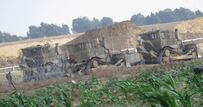
The Israeli occupation army on Wednesday morning launched a limited incursion into northern Gaza and razed Palestinian lands.
Local sources said that eight Israeli military bulldozers rolled a few hundred meters into the northern Gaza Strip town of Jabalia and leveled Palestinian-owned lands.
Shots were fired by the Israeli force that accompanied the bulldozers, they added.
Local sources said that eight Israeli military bulldozers rolled a few hundred meters into the northern Gaza Strip town of Jabalia and leveled Palestinian-owned lands.
Shots were fired by the Israeli force that accompanied the bulldozers, they added.
21 july 2019

Prime Minster of Israel, Benjamin Netanyahu greets supporters in Tel Aviv on 10 April, 2019
Media reports of an impending Israeli war on the besieged Gaza Strip are now a regular occurrence. The frequency of these reports fluctuates based on Israel’s own political landscape.
Empirical experience has taught us that when Israeli leaders are in trouble, they wage a war on Gaza. Now that Israeli Prime Minister Benjamin Netanyahu is facing the greatest challenge in his political career, Gaza is bracing for another Israeli war.
The war rumors are no longer just that. Rightwing Israeli newspaper, The Jerusalem Post recently reported that Israel’s military chief of staff, Lieutenant-General Aviv Kochavi, “has already approved operational combat plans and recently set up an administrative unit to handle the formation of a list of potential targets in the coastal enclave for when the next war breaks out.”
The Post’s own military correspondent, Anna Ahronheim concurs, that, indeed, war on Gaza “is not far away.” But unlike previous wars, the upcoming war must “have a clear and decisive win” by Israel so that “the other side will think twice about going to war in the future.”
The fallacy in Ahronheim’s analysis is obvious. Israel always approaches its wars in Gaza with the aim of having a “clear and decisive win”, aims that are often thwarted by strong Palestinian resistance in the besieged and impoverished Strip.
Second, Gaza never initiates wars. The Strip has no army or military strategy beyond self-defense tactics carried out by organized resistance factions, including Hamas, the Islamic Jihad and various PLO groups. However, if Israel thinks that a ‘decisive win’ would eradicate Palestinian resistance, it will be greatly disappointed. Gaza’s resistance, in all of its forms, against Israel and Israeli occupation goes back to the late 1940s. No amount of firepower will ever end this kind of determined resistance.
However, it is likely that Israel measures the decisiveness of its ‘victory’ based on the amount of destruction it is able to inflict on Palestinians.
Marvel at these numbers from the last major Israeli war on Gaza, in 2014, to understand the real target of Israeli wars on the Strip:
According to United Nations figures, more than 2,300 Palestinians were killed in Israel’s so-called “Operation Protective Edge”. The causalities, most of whom were civilians, included 551 children. Moreover, 11,231 were also wounded, and more than 20,000 homes were destroyed. The massive destruction was also aimed at the already ailing infrastructure of impoverished Gaza, reaching schools, hospitals, mosques and even UN shelters.
How more “decisive” must the next Israeli war be so that Israel’s warmongers may feel satisfied that their war achieved its intended objectives?
Israel wants Palestinians to accept their perpetual besiegement, embrace their fate as an occupied nation with no rights, subject to the whims of Israel and its racist, deadly policies.
However, Israeli leaders are now driven by a second objective: winning the upcoming elections.
There is much at stake for Netanyahu and his prospective coalition of rightwing ideologues and religious zealots. Israel has never held two national elections in one year, but this year is an exception.
The April 9 elections failed to achieve a decisive victory for either camp. After weeks of attempting to form a coalition government, Netanyahu accepted the inevitable: another election, which is set for September 17.
But Netanyahu is not only politically embattled. He, along with his family and close aides have been embroiled in a series of corruption charges that could potentially end his political career.
On June 6, Israel’s attorney general Avichai Mandelblit rejected Netanyahu’s bid to postpone for the second time the pre-indictment hearing in the several corruption cases concerning his misconduct while in office.
However, Netanyahu hopes to secure his position at the helm of Israeli politics a while longer, to evade corruption charges, and to eventually strike a deal to drop the charges altogether.
He is desperate to remain a prime minister. For that to happen, he will do whatever it takes to appeal to the most powerful constituency in Israel: the right wing and their religious allies.
For Israel’s right, a war is a normal state of affairs. They seem to acquire their sense of collective safety when Palestinians suffer. And, for months, Israeli rightwing voices calling for war against Gaza have massively amplified.
Even the supposedly sensible political center has joined the chorus, knowing that an anti-war stance in Israel is a losing strategy.
Head of Blue and White party, Benny Gantz, who remains Netanyahu’s strongest opponent said in an interview released last May with Channel 13: “We must strike hard, in an uncompromising manner .. We must restore the deterrence that has been eroded catastrophically for more than a year.”
Of course, there will be a next war on Gaza. It will be as “decisive” and deadly as Israeli leaders need it to be, to serve their political calculations.
But they must also be aware that wars on Gaza are no longer the cakewalks of the past. The resistance in that small, but unbreakable region, is tougher than it has ever been in the past, a natural outcome of 12 years of a relentless siege, interrupted by massively destructive and lethal military onslaughts.
A war on Gaza will also come with a price for Israel. Are Netanyahu and his government willing to endure the political fallout of another failed war? It all depends on how truly desperate corrupt Netanyahu is to remain in power and out of prison, at least for a while longer.
Media reports of an impending Israeli war on the besieged Gaza Strip are now a regular occurrence. The frequency of these reports fluctuates based on Israel’s own political landscape.
Empirical experience has taught us that when Israeli leaders are in trouble, they wage a war on Gaza. Now that Israeli Prime Minister Benjamin Netanyahu is facing the greatest challenge in his political career, Gaza is bracing for another Israeli war.
The war rumors are no longer just that. Rightwing Israeli newspaper, The Jerusalem Post recently reported that Israel’s military chief of staff, Lieutenant-General Aviv Kochavi, “has already approved operational combat plans and recently set up an administrative unit to handle the formation of a list of potential targets in the coastal enclave for when the next war breaks out.”
The Post’s own military correspondent, Anna Ahronheim concurs, that, indeed, war on Gaza “is not far away.” But unlike previous wars, the upcoming war must “have a clear and decisive win” by Israel so that “the other side will think twice about going to war in the future.”
The fallacy in Ahronheim’s analysis is obvious. Israel always approaches its wars in Gaza with the aim of having a “clear and decisive win”, aims that are often thwarted by strong Palestinian resistance in the besieged and impoverished Strip.
Second, Gaza never initiates wars. The Strip has no army or military strategy beyond self-defense tactics carried out by organized resistance factions, including Hamas, the Islamic Jihad and various PLO groups. However, if Israel thinks that a ‘decisive win’ would eradicate Palestinian resistance, it will be greatly disappointed. Gaza’s resistance, in all of its forms, against Israel and Israeli occupation goes back to the late 1940s. No amount of firepower will ever end this kind of determined resistance.
However, it is likely that Israel measures the decisiveness of its ‘victory’ based on the amount of destruction it is able to inflict on Palestinians.
Marvel at these numbers from the last major Israeli war on Gaza, in 2014, to understand the real target of Israeli wars on the Strip:
According to United Nations figures, more than 2,300 Palestinians were killed in Israel’s so-called “Operation Protective Edge”. The causalities, most of whom were civilians, included 551 children. Moreover, 11,231 were also wounded, and more than 20,000 homes were destroyed. The massive destruction was also aimed at the already ailing infrastructure of impoverished Gaza, reaching schools, hospitals, mosques and even UN shelters.
How more “decisive” must the next Israeli war be so that Israel’s warmongers may feel satisfied that their war achieved its intended objectives?
Israel wants Palestinians to accept their perpetual besiegement, embrace their fate as an occupied nation with no rights, subject to the whims of Israel and its racist, deadly policies.
However, Israeli leaders are now driven by a second objective: winning the upcoming elections.
There is much at stake for Netanyahu and his prospective coalition of rightwing ideologues and religious zealots. Israel has never held two national elections in one year, but this year is an exception.
The April 9 elections failed to achieve a decisive victory for either camp. After weeks of attempting to form a coalition government, Netanyahu accepted the inevitable: another election, which is set for September 17.
But Netanyahu is not only politically embattled. He, along with his family and close aides have been embroiled in a series of corruption charges that could potentially end his political career.
On June 6, Israel’s attorney general Avichai Mandelblit rejected Netanyahu’s bid to postpone for the second time the pre-indictment hearing in the several corruption cases concerning his misconduct while in office.
However, Netanyahu hopes to secure his position at the helm of Israeli politics a while longer, to evade corruption charges, and to eventually strike a deal to drop the charges altogether.
He is desperate to remain a prime minister. For that to happen, he will do whatever it takes to appeal to the most powerful constituency in Israel: the right wing and their religious allies.
For Israel’s right, a war is a normal state of affairs. They seem to acquire their sense of collective safety when Palestinians suffer. And, for months, Israeli rightwing voices calling for war against Gaza have massively amplified.
Even the supposedly sensible political center has joined the chorus, knowing that an anti-war stance in Israel is a losing strategy.
Head of Blue and White party, Benny Gantz, who remains Netanyahu’s strongest opponent said in an interview released last May with Channel 13: “We must strike hard, in an uncompromising manner .. We must restore the deterrence that has been eroded catastrophically for more than a year.”
Of course, there will be a next war on Gaza. It will be as “decisive” and deadly as Israeli leaders need it to be, to serve their political calculations.
But they must also be aware that wars on Gaza are no longer the cakewalks of the past. The resistance in that small, but unbreakable region, is tougher than it has ever been in the past, a natural outcome of 12 years of a relentless siege, interrupted by massively destructive and lethal military onslaughts.
A war on Gaza will also come with a price for Israel. Are Netanyahu and his government willing to endure the political fallout of another failed war? It all depends on how truly desperate corrupt Netanyahu is to remain in power and out of prison, at least for a while longer.
19 july 2019
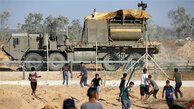
Palestinian protesters flee from an Israeli military vehicle carrying tanks of skunk water across the barbed-wire fence during clashes along a fence near Rafah in the southern Gaza Strip, on July 19, 2019
Israeli forces have attacked Palestinians taking part in the weekly “Great March of Return” rallies, injuring 98 Gazan protesters, according to the Gazan Health Ministry.
The Gazan Health Ministry also said that 49 of the injured protesters had sustained bullet wounds from Israeli live fire.
Four paramedics were also among the wounded.
The rallies have been held every week since March 30 last year. The Palestinians demand the right to return of those driven out of their homeland by Israeli aggression.
Israeli troops have killed at least 305 Palestinians since the beginning of the rallies and wounded nearly 18,000 others, according to the Gazan Health Ministry.
In March, a United Nations (UN) fact-finding mission found that Israeli forces committed rights violations during their crackdown against the Palestinian protesters in Gaza that may amount to war crimes.
Gaza has been under Israeli siege since June 2007, which has caused a decline in living standards.
Israel has also launched three major wars against the enclave since 2008, killing thousands of Gazans each time and shattering the impoverished territory’s already poor infrastructure.
Israeli forces have attacked Palestinians taking part in the weekly “Great March of Return” rallies, injuring 98 Gazan protesters, according to the Gazan Health Ministry.
The Gazan Health Ministry also said that 49 of the injured protesters had sustained bullet wounds from Israeli live fire.
Four paramedics were also among the wounded.
The rallies have been held every week since March 30 last year. The Palestinians demand the right to return of those driven out of their homeland by Israeli aggression.
Israeli troops have killed at least 305 Palestinians since the beginning of the rallies and wounded nearly 18,000 others, according to the Gazan Health Ministry.
In March, a United Nations (UN) fact-finding mission found that Israeli forces committed rights violations during their crackdown against the Palestinian protesters in Gaza that may amount to war crimes.
Gaza has been under Israeli siege since June 2007, which has caused a decline in living standards.
Israel has also launched three major wars against the enclave since 2008, killing thousands of Gazans each time and shattering the impoverished territory’s already poor infrastructure.
17 july 2019
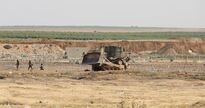
The Israeli occupation army on Wednesday morning dispatched several bulldozers to a border area in northern Gaza and opened fire at a resistance post the in southern Gaza.
According to local sources, armored bulldozers left an Israeli military post behind the security fence in northern Gaza and carried out a limited incursion into the east of Beit Hanoun, where they embarked on leveling lands.
Meanwhile, the Israeli occupation forces opened fire at an observation post belonging to the Palestinian resistance in Khan Younis, south of Gaza.
According to local sources, armored bulldozers left an Israeli military post behind the security fence in northern Gaza and carried out a limited incursion into the east of Beit Hanoun, where they embarked on leveling lands.
Meanwhile, the Israeli occupation forces opened fire at an observation post belonging to the Palestinian resistance in Khan Younis, south of Gaza.
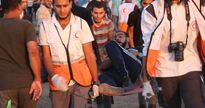
Five Palestinian citizens suffered injuries on Tuesday evening when the Israeli occupation forces opened live ammunition at an auto rickshaw they were aboard in Umm an-Naser village, north of the Gaza Strip.
The shooting attack on the vehicle made it lose balance and overturn, injuring all the passengers aboard it, according to local sources.
The wounded citizens were provided with medical assistance in a local hospital.
The IOF deliberately opens fire at Palestinian citizens who approach certain border areas in northern and eastern Gaza.
The shooting attack on the vehicle made it lose balance and overturn, injuring all the passengers aboard it, according to local sources.
The wounded citizens were provided with medical assistance in a local hospital.
The IOF deliberately opens fire at Palestinian citizens who approach certain border areas in northern and eastern Gaza.
16 july 2019

Leah Goldin, mother of Hadar Goldin whose remains have been held by Hamas since Operation Protective Edge, confronts the prime minister and accuses him of trying to silence the families of MIAs and POWs days before the 5-year anniversary of the 2014 war
The mother of a fallen IDF soldier whose remains are held by Hamas in Gaza was left sobbing after a meeting with the prime minister, which she left just half an hour after it began.
Leah Goldin’s son Hadar died alongside five other IDF soldiers during Operation Protective Edge on July 20, 2014, and his body is believed to be held by the terror group in the enclave to this day. Israel this week officially marks five years since the seven-week-long war broke out.
"The whole purpose of the meeting was to silence the families shortly before the anniversary of Operation Protective Edge,” Goldin said after the meeting, which was held Tuesday evening between Prime Minister Benjamin Netanyahu and the families of Israelis held captive in the Strip.
The family of another soldier who was killed alongside Goldin - Oron Shaul - was also at the meeting. The relatives of Avera Mengistu and Hisham al-Sayed - two mentally ill Israeli citizens captured by Hamas after voluntarily crossing into Gaza - were among the attendees as well.
At the onset of the meeting the prime minister apparently offered to fly the families to New York City in order to allow them to participate at a ceremonial event at the main U.N. Headquarters, raising awareness about Israeli MIAs and POWs.
The offer prompted Goldin to confront Netanyahu as to why nothing has been done by his government until this point. "I wonder why all of a sudden you remembered who we are, after five years during which you did nothing,” she said during the meeting. “We don’t need a trip to New York, we’ve already done all of this successfully ourselves."
The Goldin family issued a statement after the event, suggesting Netanyahu’s offer was made as part of his attempt to silence the bereaved families during a time when the country is marking Protective Edge’s anniversary.
“We feel as though the prime minister was doing all he could to make it through the next two weeks, during which we will mark five years since the abduction of our son Hadar,” said the family. “Even after this meeting, it’s still unclear to us why Netanyahu is not making the return of our sons a condition for any rehabilitation of Gaza.”
"Prime Minister Netanyahu understands the pain of the families and will continue to do everything in his power to bring their sons home," said The Prime Minister's Office in response.
The mother of a fallen IDF soldier whose remains are held by Hamas in Gaza was left sobbing after a meeting with the prime minister, which she left just half an hour after it began.
Leah Goldin’s son Hadar died alongside five other IDF soldiers during Operation Protective Edge on July 20, 2014, and his body is believed to be held by the terror group in the enclave to this day. Israel this week officially marks five years since the seven-week-long war broke out.
"The whole purpose of the meeting was to silence the families shortly before the anniversary of Operation Protective Edge,” Goldin said after the meeting, which was held Tuesday evening between Prime Minister Benjamin Netanyahu and the families of Israelis held captive in the Strip.
The family of another soldier who was killed alongside Goldin - Oron Shaul - was also at the meeting. The relatives of Avera Mengistu and Hisham al-Sayed - two mentally ill Israeli citizens captured by Hamas after voluntarily crossing into Gaza - were among the attendees as well.
At the onset of the meeting the prime minister apparently offered to fly the families to New York City in order to allow them to participate at a ceremonial event at the main U.N. Headquarters, raising awareness about Israeli MIAs and POWs.
The offer prompted Goldin to confront Netanyahu as to why nothing has been done by his government until this point. "I wonder why all of a sudden you remembered who we are, after five years during which you did nothing,” she said during the meeting. “We don’t need a trip to New York, we’ve already done all of this successfully ourselves."
The Goldin family issued a statement after the event, suggesting Netanyahu’s offer was made as part of his attempt to silence the bereaved families during a time when the country is marking Protective Edge’s anniversary.
“We feel as though the prime minister was doing all he could to make it through the next two weeks, during which we will mark five years since the abduction of our son Hadar,” said the family. “Even after this meeting, it’s still unclear to us why Netanyahu is not making the return of our sons a condition for any rehabilitation of Gaza.”
"Prime Minister Netanyahu understands the pain of the families and will continue to do everything in his power to bring their sons home," said The Prime Minister's Office in response.
Page: 30 - 29 - 28 - 27 - 26 - 25 - 24 - 23 - 22 - 21 - 20 - 19 - 18 - 17 - 16 - 15 - 14 - 13 - 12 - 11 - 10 - 9
Truce violations List of names Pictures of martyrs
Days: Aug: 26 - 25 - 24 - 23 - 22 - 21 - 20 - 19 - 18 - 17 - 16 - 15 - 14 - 13 - 12 - 11 - 10 - 9 - 8 - 7 - 6 - 5 - 4 - 3 - 2 - 1
July: 31 - 30 - 29 - 28 - 27 - 26 - 25 - 24 - 23 - 22 - 21 - 20 - 19 - 18 - 17 - 16 - 15 - 14 - 13 - 12 - 11 - 10 - 9 - 8
